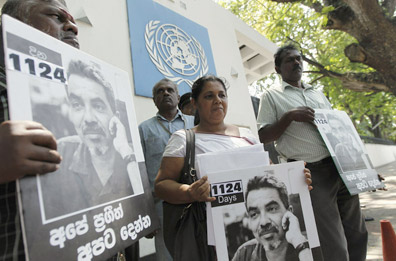UN report on Sri Lanka and Freedom of Expression
Earlier in September, Ruki Fernando was in Geneva as the reports of
the UN Office of the High Commissioner for Human Rights (OHCHR) released
the longest page-report (251 pages) narrating the horrific stories of
unlawful killings and enforced disappearances out of Sri Lanka.
 |
|
Sandhya Ekneligoda protests
before the UN premises in Colombo.
newsfirst.lk |
Having been investigated himself under the Terrorism Act, one which
the OHCHR report has called for reviews. Ruki accounts a personal
involvement and knowledge as he writes about the new UN report, its pros
and cons, and how it could affect the cases of missing Sri Lankan
journalists like Subramanium Ramachandran and Prageeth Ekneligoda as
well as freedom of expression at large.
In early September, I visited the parents of Subramanium Ramachandran,
a Tamil journalist from Jaffna who has been reported as missing since
February 2007, having been last seen at an Army checkpoint. There has
been nothing heard since and his parents, now in their 80s, still desire
for truth and justice, but appeared to have given up hope that their son
will return.
From Jaffna, I went to Geneva. There the anguish of Ramachandran's
parents and many other families and survivors, was brought alive through
the reports of the UN Office of the High Commissioner for Human Rights (OHCHR).
The longer 251-page report (OISL) narrates horrific stories of unlawful
killings, enforced disappearances, arbitrary detention, torture, sexual
and gender based violence, attacks on civilians in places such as
hospitals and churches.
It highlighted reprisals against those seeking to challenge and
question authorities to expose the truth and seek justice, which
journalist Ramachandran had tried to do. It revealed denials, failures
to carry out investigations and prosecutions such as in Ramachandran's
disappearance. It highlights inadequacy of domestic mechanisms and
recommended a special hybrid court with international judges, lawyers,
prosecutors and investigators, as well as actions by member states of
the UN.
Under investigation
The OHCHR report also called for a review of the Prevention of
Terrorism Act - under which I was arrested last year and I am still
under investigation. A gag order restricting my freedom of expression is
still there, after having given interviews to BBC, CNN another media
outlets. Many other journalists, opposition politicians, clergy and
activists have been arrested and detained under this draconian law,
which has been and is still being used to curtail dissent and free
expression.
As the UN report was being released, I was sitting next to families
of disappeared (journalists), including Sandhya Ekneligoda, wife of
disappeared Sinhala journalist Prageeth Ekneligoda, outside the meeting
room in the UN, as we were not allowed to go inside.
I tried my best to translate the High Commissioner's remarks through
the webcast to Sandhya. Prageeth's case was mentioned in both reports.
Sandhya had waged an unrelenting battle for truth and justice, including
giving testimony to the OHCHR. She welcomed the report, emphasizing the
importance of looking at the past to move forward.
The OISL report detailed the killing of the Sunday Leader[3] editor
Lasantha Wickramatunge, the series of attacks on the Uthayan and the
alleged detention, murder and desecration of the dead body by the Army,
of the well-known LTTE female TV presenter Isaipriya. Ramachandran's was
amongst the many such cases that were not mentioned by name.
The reports highlighted the widespread, systemic and repeated
targeting of media known to be critical of the government over an
extended period of time, insufficient protection offered to media
workers who faced recurrent attacks and how this led to self-censorship
and exile in fear of their lives, as well as fact that the number of
journalists and media workers killed was amongst the highest in the
world.
Serious violations
The report, however, appears not to have dealt with the connection
between free expression and broader patterns of serious violations. For
example, it has not emphasized the lack of access and restrictions for
independent media during the last phase of the war or even after the war
and how this and the general repression of freedom of expression
prevented serious violations being highlighted.
The UN reports also doesn't recognize the widespread use of State and
private media to discredit independent-minded journalists, press freedom
activists and others critical of the government, which hampered their
ability to report freely and also led to exile and self-censorship and
the fact that a large proportion of journalists killed during the period
were Tamils.
The reports noted that "surveillance, interference and harassment of
human rights defenders continued to be reported from the district level"
in 2015, despite a "significant opening of space for freedom of
expression at least in Colombo". Indeed, few days before the launch of
the reports, Police in North and East obstructed peaceful signature
campaigns for a petition to the UN.
The OISL report emphasized the importance of an environment where
victims and witnesses can participate without fear in transitional
justice mechanisms and that such a climate does not yet exist.
Truth seeking, memorialization, prosecutions will depend on the
extent to which people, particularly survivors and victims' families
feel free to express themselves without fear of reprisals.
The media will have a major role to play in covering these processes
independently. It will have to report the contents of the OHCHR reports,
reactions or lack thereof in a responsible manner.
This will depend on the extent to which media can function
independently, without threats, restrictions or political interference.
Ruki Fernando is a Sri Lankan writer and human rights / press
freedom advocate. He has a court order restricting his freedom of
expression in relation to an ongoing investigation on anti-terror
charges.
His writings are available at www.rukiiiii.wordpress.com |

